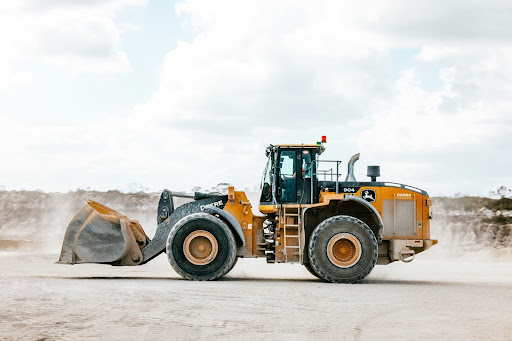Commercial equipment financing is a critical tool for businesses that need to acquire machinery, vehicles, or other heavy-duty equipment without draining cash reserves. These solutions help businesses secure the necessary funds for purchasing equipment, vehicles, and software, while also supporting the acquisition, maintenance, and upgrade of technology infrastructure. By preserving working capital, equipment financing ensures that businesses have the resources needed for daily operations and future growth. Upgrading business equipment is a significant investment, and financing options can help support this financial commitment.
Charter Capital brings industry expertise across sectors such as construction, manufacturing, and others nationwide industries, delivering a wide variety of equipment assets tailored to every businesses’ unique needs.
In this comprehensive guide, we’ll explain what commercial equipment financing is, how it differs from other financing options, the types of products available, how to secure the best rates, common mistakes to avoid, and answers to frequently asked questions about loan terms, credit requirements, and more.
What Is Commercial Equipment Financing?
Commercial equipment financing refers to loan or lease solutions used by businesses to acquire equipment essential to their operations. The process of applying for commercial equipment financing is typically streamlined, with fast approval times. The purchased or leased asset—such as trucks, machinery, IT hardware, or manufacturing tools—typically serves as collateral for the financing, making it more accessible than unsecured loans.
Obtaining formal approval or pre-approval is a key step in the financing process. Credit approval is based on borrower qualifications and program guidelines. Financing options are subject to certain restrictions and conditions. Businesses should carefully determine which financing solution best fits their needs.
How Is Commercial Equipment Financing Different from Other Types of Equipment Financing?

While “equipment financing” is a broad term, commercial equipment financing specifically serves businesses, not individuals. It usually involves larger loan amounts, tailored repayment structures, and consideration of business credit instead of personal credit. Commercial equipment financing also allows businesses to preserve bank lines for other needs, such as working capital or emergencies.
Commercial financing may also come with tax incentives and options to align payments with business cycles. Many alternative financing options do not require blanket liens, unlike traditional bank loans. Traditional bank financing often involves extensive documentation, collateral requirements, and time-consuming approval processes, whereas alternative options can offer a simpler and faster experience. In addition, commercial equipment financing often provides flexible terms and customized leasing structures to meet specific needs, providing business owners with more customization regarding capital access.
Types of Commercial Equipment Finance Products
1. Equipment Loans
You borrow a lump sum to purchase equipment and pay it back over time. Equipment loans provide the necessary funds for purchasing essential business assets. Funding is typically disbursed quickly to facilitate timely equipment acquisition. Equipment loans also represent a significant investment in your business’s future. You own the equipment from day one. Many equipment loans offer fixed rates, giving you predictable monthly payments that won’t increase over time.
2. Equipment Leases
Equipment leasing is a flexible financing option that allows you to rent equipment for a set term. Various leasing structures are available to align with your business goals. Equipment leases often come with flexible terms to suit different operational needs. At the end of the term, you can return, renew, or buy it.
3. Sale-Leaseback Agreements
Sell owned equipment to a lender and lease it back—helping free up capital while allowing businesses to maintain use and control of their equipment.
4. Equipment Lines of Credit
Access revolving credit to finance equipment on an as-needed basis. Access to equipment lines of credit is subject to credit approval. Certain restrictions and eligibility criteria may apply.
Who Uses Commercial Equipment Financing?

Our expertise extends across a wide range of industry sectors, including:
- Construction and excavation
- Manufacturing and warehousing
- Agriculture and farming
- Transportation and logistics
- Medical and dental practices
- Food service and hospitality
- IT and telecom providers
We help businesses acquire the equipment you need—whether it’s trucks, tractors, hardware, or other essential assets—so you can operate efficiently and achieve your goals.
How to Get the Best Commercial Equipment Financing Rates
- Improve your credit score – Business and personal credit both play a role.
- Show strong revenue and cash flow – Lenders like financial stability.
- Compare multiple offers – Banks, brokers, and online lenders all differ.
- Work with a specialist – A broker like Charter Capital helps match you to the best-fit lender and terms.
A streamlined application process and fast approval can help businesses complete transactions quickly. Securing pre-approval can also give businesses confidence when purchasing equipment.
Common Mistakes in Commercial Equipment Financing

- Choosing the wrong loan or lease structure
- Ignoring the total cost of ownership
- Overextending credit or overborrowing
- Forgetting to claim tax deductions
- Not reading the fine print on early repayment penalties or end-of-term options
- Failing to review restrictions and conditions that may be subject to the financing agreement
- Not considering the impact of blanket liens on other business assets
Frequently Asked Questions About Commercial Equipment Financing
What Credit Score Do You Need for Commercial Equipment Financing?
Most lenders prefer a minimum credit score of 600 for commercial equipment financing. All credit products are subject to credit approval and program guidelines, and may be subject to additional restrictions or fees. However, businesses with scores above 650 are more likely to qualify for favorable interest rates and lower down payments. Some alternative lenders and equipment finance brokers may approve financing for scores as low as 500, especially if the business has strong revenue or the borrower offers a larger down payment. In addition to credit score, lenders will consider time in business, cash flow, and the value of the equipment being financed.
How Long Is a Commercial Equipment Loan For?
Commercial equipment loans typically range from 12 to 84 months (1 to 7 years). The loan term depends on the type of equipment being financed, its expected useful life, and the borrower’s creditworthiness. Some lenders also offer flexible terms to accommodate different business needs, allowing for more customized repayment options. For expensive or long-lasting equipment, lenders may offer extended terms to reduce monthly payments. However, longer terms may result in higher total interest paid over time.
What Are Typical Terms for Commercial Equipment Financing?
Typical commercial equipment financing terms include:
- Loan Amounts: $10,000 to $5 million+
- Interest Rates: 5% to 30%, based on credit, lender, and asset type
- Repayment Terms: 1–7 years
- Down Payments: Often 0% to 20%
- Collateral: The equipment itself usually serves as security
Some lenders may have restrictions on the size or type of transactions that are eligible for financing, so it’s important to review all program details before applying.
Some lenders may also offer seasonal payment structures, step-up payments, or deferred payments to better align with your cash flow.
Is Equipment Financing Tax-Deductible?
Yes. In many cases, the interest on commercial equipment loans is tax-deductible. Additionally, under Section 179 of the IRS Tax Code, businesses may be able to deduct the full purchase price of qualifying equipment in the year it’s financed, up to a set annual limit. Always consult a tax professional for specific guidance.
Does Commercial Equipment Financing Affect Business Credit?
Yes. Like any form of business loan, commercial equipment financing can affect your business credit score. Timely payments will help improve your credit profile, while missed or late payments can lower your score and affect future borrowing ability.
Is It Better to Lease or Finance Commercial Equipment?
It depends on your goals:
- Finance (Loan) if you want to own the equipment and use it long-term.
- Lease if you prefer lower upfront costs, short-term use, or want to upgrade regularly. Equipment leasing offers various leasing structures to suit different business models, providing flexibility for businesses to choose terms that align with their operational needs.
Leasing vs. Financing: A Quick Comparison
| Feature | Leasing | Financing (Loan) |
| Ownership | No (unless buyout option) | Yes |
| Upfront Costs | Lower | May require down payment |
| Flexibility | High (easy to upgrade or return); equipment leasing often provides flexible terms and upgrade options | Lower |
| Tax Benefits | Operational expense deductions | Interest & depreciation |
| Long-Term Cost | Can be higher | Typically lower; many loans offer fixed rates for predictable payments |
Why Work With a Commercial Equipment Finance Specialist?
Specialists like Charter Capital understand the equipment, the industries, and the challenges you face. With deep expertise and industry expertise across sectors such as healthcare, IT, and renewable energy, we provide tailored financing services designed to meet the unique needs of your business. Instead of offering a one-size-fits-all loan, we work with a wide network of lenders to build a financing solution that works for your business goals, cash flow, and credit profile.
We’ve helped thousands of businesses secure commercial equipment financing—whether for one truck or an entire fleet, a CNC machine or a full manufacturing line.
Get Started with Commercial Equipment Financing
Whether you’re looking to purchase new equipment, upgrade existing assets, or simply explore financing options that better align with your growth plans, we’re here to help.
- Competitive rates
- Flexible structures
- Fast approvals
- Personalized support
Call us today at 480-874-5402 or connect with us here!

